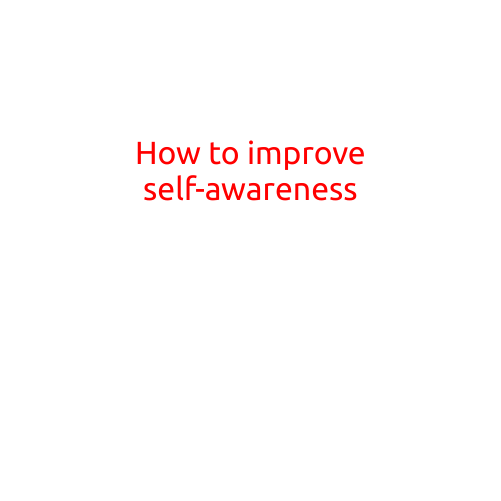
How to Improve Self-Awareness
Self-awareness is the ability to have a clear and accurate understanding of one’s thoughts, feelings, and behaviors. It is a vital component of personal growth and development, as it enables individuals to make better decisions, build stronger relationships, and achieve their goals. However, self-awareness is not always easy to come by, and it often requires intentional effort and practice. In this article, we will explore some effective ways to improve self-awareness and become a more authentic and effective individual.
1. Practice Mindfulness
Mindfulness is the practice of being present and fully engaged in the current moment, without judgment or distraction. Through mindfulness, you can cultivate a greater awareness of your thoughts, emotions, and physical sensations, which is a key component of self-awareness. To practice mindfulness, set aside a few minutes each day to sit quietly, focus on your breath, and observe your thoughts and emotions without judgment.
2. Keep a Journal
Keeping a journal is a powerful way to develop self-awareness. Writing down your thoughts, feelings, and experiences on a daily basis can help you identify patterns and themes, and gain insights into your behavior and motivations. Reflecting on your journal entries can also help you develop a greater understanding of your strengths and weaknesses, and identify areas for personal growth and improvement.
3. Seek Feedback from Others
Seeking feedback from others can be a valuable way to gain insight into your thoughts, feelings, and behaviors. Ask trusted friends, family members, or colleagues for their honest opinions about you, and be open to constructive criticism and feedback. Keep in mind that feedback is not the same as criticism, and that it is meant to help you grow and improve, not tear you down.
4. Practice Self-Reflection
Self-reflection is the process of examining your own thoughts, feelings, and behaviors in order to gain a deeper understanding of yourself. This can involve asking yourself questions such as “What am I proud of?” “What am I ashamed of?” “What are my strengths and weaknesses?” and “What do I want to achieve?” Regular self-reflection can help you develop a greater awareness of your values, goals, and motivations, and identify areas for personal growth and improvement.
5. Seek Out New Experiences
Seeking out new experiences and challenges can be a powerful way to develop self-awareness. By stepping out of your comfort zone and trying new things, you can gain new insights into your strengths and weaknesses, and develop a greater sense of confidence and self-assurance.
6. Practice Self-Care
Practicing self-care is essential for developing self-awareness. When you take care of your physical, emotional, and mental well-being, you are better able to tune into your thoughts, feelings, and behaviors, and gain a greater understanding of yourself. This can involve engaging in activities such as exercise, meditation, and spending time in nature, as well as seeking out professional help when needed.
7. Learn to Listen to Your intuition
Learning to listen to your intuition is an important part of developing self-awareness. Your intuition is a valuable tool that can help you make decisions and guide you towards your goals. By tuning into your intuition, you can gain a greater sense of clarity and confidence, and make more informed decisions.
8. Practice Gratitude
Practicing gratitude is a powerful way to cultivate self-awareness. By focusing on what you are grateful for, you can develop a greater sense of appreciation and contentment, and gain a greater understanding of your values and priorities. Regularly reflect on what you are grateful for, and make an effort to express gratitude to others.
9. Take Responsibility
Taking responsibility for your thoughts, feelings, and behaviors is essential for developing self-awareness. By taking ownership of your actions and decisions, you can gain a greater sense of control and empowerment, and develop a greater understanding of yourself.
10. Practice Forgiveness
Practicing forgiveness is a powerful way to develop self-awareness. By letting go of past hurts and resentments, you can gain a greater sense of freedom and peace, and develop a greater understanding of yourself and others. Regularly practice forgiveness and letting go of negative emotions, and make an effort to cultivate compassion and understanding towards yourself and others.
In conclusion, developing self-awareness takes time and effort, but it is a powerful tool for personal growth and development. By practicing mindfulness, keeping a journal, seeking feedback from others, practicing self-reflection, seeking out new experiences, practicing self-care, learning to listen to your intuition, practicing gratitude, taking responsibility, and practicing forgiveness, you can gain a greater understanding of yourself and become a more authentic and effective individual.





